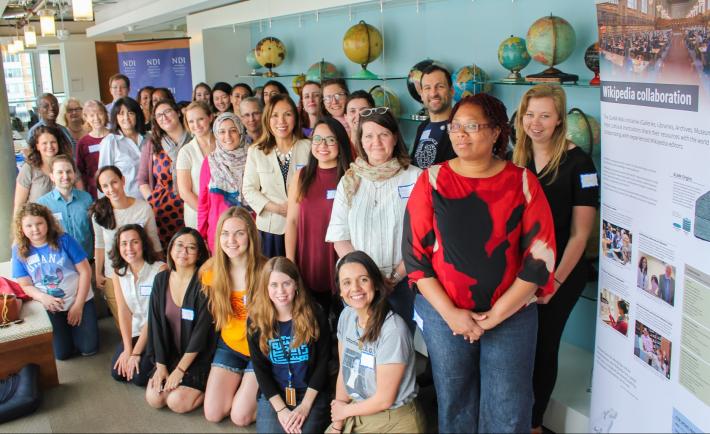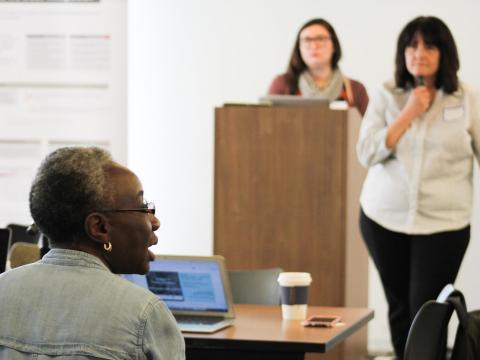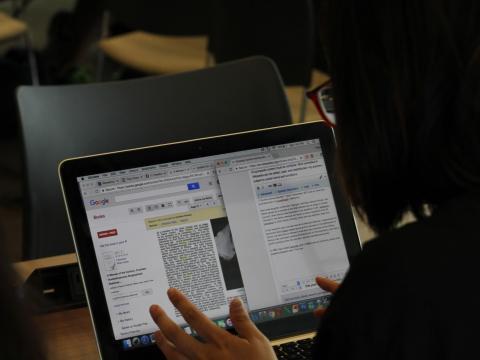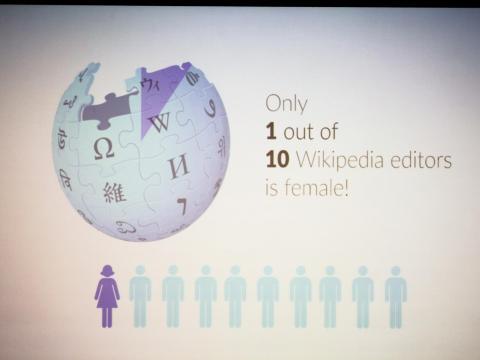“What will people think of us when they look back and find that in 2017, Wikipedia only had 16.97 percent of its biographies about women? They’ll say ‘shame on them,’” said Wikimedia-DC’s Rosie Stephenson-Goodknight at NDI, Wikimedia-DC and the Women’s Media Center’s first joint edit-a-thon.
Wikipedia is the main online encyclopedia of our digital age. Openly sourced from the public, one might expect a nearly equal rate of women’s representation on Wikipedia—but it’s not even close. As Stephenson-Goodknight noted, only 17 percent of biographies on Wikipedia’s English site are of women, and it’s an even lower number on most of the site’s other 295 languages.
NDI, Wikimedia-D.C. and the Women’s Media Center, sponsored a Wikipedia edit-a-thon to boost the online representation of women in media and politics. Thirty-eight volunteers were trained by Wikimedia-DC on how to carefully edit and create content, cite reliable sources, work in a transparent manner, and provide full disclosure of any conflict of interest. The edit-a-thon achieved impressive statistics: 38 new Wikipedia editors, 164 new edits and 3,880 additional words. Volunteers learned how to cite reliable sources, close the gender gap by adding additional biographies and make sure the notable women who have made it into the competitive 17 percent are discussed accurately and substantively.
Not only did the edit-a-thon aim to close this online gender gap by adding additional biographies, but participants also learned how to translate existing entries and edit them in order to better illustrate women’s substantive work and achievements. This is important because women’s successes are often attributed to male counterparts in their lives, rather than giving them credit in their own accord.
“They’re written up to start with as the ‘mother of’ or ‘wife of’ or ‘daughter of’ and not in their own right. So there’s a lot of editing work that needs to be done so that women’s notable achievements come first and their family connections come later on—like the entries about men!”
- NDI Gender, Women and Democracy director Sandra Pepera
Soraya Chemaly, the Director of the Women's Media Center Speech Project, also pointed out why working to increase biographies is important and how the disproportionate documentation of men and women’s accomplishments impact our society today.
“Imbalances in storytelling mean that public understanding of social problems is distorted... So, from the perspective of social justice and equality, media injustice feeds broader injustices.”
Stephenson-Goodknight, co-founder of WikiProject Women in Red and Wikimedia’s Gender Diversity Mapper, has been editing and creating content on Wikipedia for the last 10 years. Her work closing the Wikipedia gender gap started as an annual event during Women’s History Month in March. In July 2015, she co-founded Women in Red to make a more persistent, year-round effort to solve this problem. In November 2014, women’s biographies were a mere 15 percent; today, there are an additional 40,000 biographies.
“These are the role models that people are reading about today. So when we see that there are so few women in these encyclopedias and we know that women hold up 50 percent of the sky, we have to wonder what effect does that have on society?”
- Wikimedia-DC’s Rosie Stephenson-Goodknight
One of the participants, Martha Allen, who works for the Women’s Institute for Freedom of the Press, said she hopes to help boost the current numbers, not just for biographies in English and for notable American leaders, but to increase the representation of women from different countries. “Really, the bottom line is we want to see more women included in the history of the world… So we want that figure that we heard—17 percent—to be raised,” Allen said.
Through NDI staff participating at the event, the Institute hopes to continue this work by incorporating the histories of notable women from around the world and in multiple languages.
“The principle of making political women’s profiles accessible to as many people as possible in as many languages as possible through Wikimedia’s very democratic community and practice? Absolutely, as much as we can do of that, we will do,” Pepera said.







